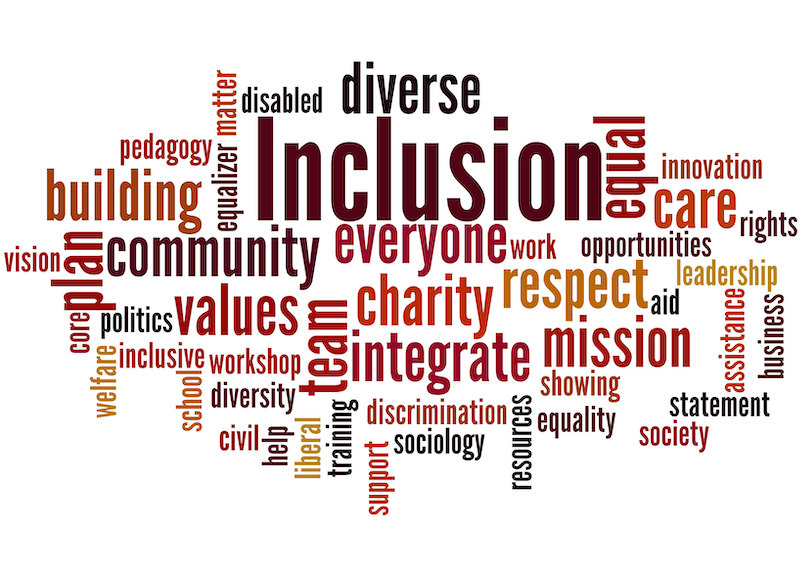The title of this article may have already stirred some emotional response in the reader—topics of diversity often do. As Christians, we can develop more understanding, compassion, and empathy for any group, while holding fast to our biblical worldview and Christian practice. In fact, I believe our faith in Christ encourages us to show God’s love to all people, even if we disagree with them. There is a way to judge no one and love everyone without giving up our Christian values.
Another reason for a possible emotional response is that almost all people have some discomfort discussing topics of racism and would rather avoid it altogether. Most white people I have met, for example, become immediately defensive or evasive when the topic comes up. We tend to deny that racism remains in our society, which negates the experiences of people of color as well as other marginalized groups. That is exactly how I was before I opened myself to the possibility that racism and other prejudices might actually still exist in America. An African American friend of mine loved and cared for me enough to start me on a journey of discovery, which radically changed my understanding of the problem and of how to be part of the solution.
The Challenge

The challenge of discussing diversity, equity, and inclusion (DEI) can be even more pronounced in Christian circles than in the general public, because we rightly believe that we are all created by God and that there is only one race—the Human Race. Verses such as Galatians 3:28 reinforce this: “There is neither Jew nor Gentile, neither slave nor free, nor is there male and female, for you are all one in Christ Jesus.” While this verse primarily expresses that there are no lesser or greater Christians based on background, it can be misinterpreted that cultural challenges are not present in the Body of Christ. We can incorrectly use verses like this and others to recuse ourselves from any serious examination of cultural problems affecting our school communities.
While we can agree that the Lord wants all people to live in harmony, He never said it would be easy. The Bible shows us the ideals of godly behavior, but we know that we often fall short of those ideals. I submit that appropriately addressing DEI in Christian schools is one of those areas in which we too often fall short. So much so that we seldom, if ever, directly address the topic. We must have the courage to get past our defensiveness and discomfort, so we can begin the process of identifying the problem and creating solutions in our own school communities.
Awareness
My experience as a leader of six Christian school systems has clearly shown me that we have a problem. I could cite multiple examples from each of those schools to illustrate this point, but I will share just one. As a superintendent, I invited the just-named valedictorian to my office to congratulate her for that honor and for receiving a full ride to Harvard. I asked her how her experience at our school—a large, highly respected Christian school in that area—had been. She told me that the education was good but that she had experienced consistent racism for the entirety of her time there. She experienced multiple racial slurs, was not accepted into social groups, was frequently asked to speak for her race in class discussions, and had students constantly and inappropriately touch her hair and ask how she treated it. While I knew that racism still existed, I had not been aware that this level of prejudice was present at our school. I asked why she never came to me about this, and she said that she had gone to teachers and principals before, but they had always told her that she was overreacting, so she gave up reporting anything. Instead, she decided to keep her head down and just get through school. I asked her parents to come in and they verified her story, and felt that many parents, staff, and teachers treated them with racial overtones as well. I deeply apologized, which they appreciated, but added that it came far too late for them.
Before you think I am unfairly picking on Christian schools, know that the problems we have are reflective of the larger society in which we live. You need look no further than the current headlines to realize that we still have a racial problem in this country. No matter what you may think of it, it is a problem. Any serious study of American history reveals patterns of oppression and persecution of certain groups that persist to this day even though sometimes in different form or degree. It is inaccurate to imagine our society, our schools, or ourselves as somehow completely free from all the prejudices, biases, and stereotypes of the past.
Mission-Driven Planning and Strategy
What do we do once we are open to the prospect that we can and should address DEI in Christian schools? The approach must be strategic, well planned, and mission driven. You may have someone in your school that is an expert, or you may need to consider engaging an outside consultant who is also a Christian. This will be a process, not a one-time event, and the approach should include:
- Definition of terms and understanding of the issues
- Multicultural training of all school constituencies
- Cultural discovery of the self and others
- Honest yet guided dialogue
- Developing programs and approaches to systemically enhance DEI in your school
- Connecting every step to biblical truth and the love of Jesus
One practical step I took was to develop an African American Parent Forum at the school I mentioned above. I thought no one might show to a meeting of this type led by a white superintendent, but 50 parents showed up for the first meeting. While tentative at first, they thanked me for being transparent, for giving them a forum to dialogue and for the concern I was showing them. This type of program and others can be created to interact and build mutual understanding and respect between all school constituents.
Challenging and Necessary
Addressing DEI in our Christian schools is challenging, yet necessary. At times it can be uncomfortable and sometimes messy, but it can be done sensitively, civilly, and with positive results. The mere fact of school leadership embarking upon a multicultural journey will speak volumes to your community. You will demonstrate the love of Jesus by showing concern for your neighbors of every background. You will not only create a healthier environment for all our constituents, but you will create growth and change in yourself in ways you may never have imagined. And your school will move closer to becoming a redemptive community that better reflects the kingdom of God.
About the Author
 Dr. John Moran has been a leader in Christian schools and colleges for over 21 years. His most recent position was as the chancellor of a system of Christian schools and colleges. He holds a Master of Education from the Harvard Graduate School of Education and a Doctorate of K12 and Higher Education Leadership from the University of Southern California, where he completed a dissertation on African American parents’ perspectives on special education. He is a published author, motivational speaker, and strategic consultant, who is continuing his efforts to enhance diversity, equity, and inclusion throughout Christian education and beyond. He can be reached at jgmoran1@gmail.com.
Dr. John Moran has been a leader in Christian schools and colleges for over 21 years. His most recent position was as the chancellor of a system of Christian schools and colleges. He holds a Master of Education from the Harvard Graduate School of Education and a Doctorate of K12 and Higher Education Leadership from the University of Southern California, where he completed a dissertation on African American parents’ perspectives on special education. He is a published author, motivational speaker, and strategic consultant, who is continuing his efforts to enhance diversity, equity, and inclusion throughout Christian education and beyond. He can be reached at jgmoran1@gmail.com.

